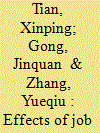| Srl | Item |
| 1 |
ID:
149777


|
|
|
|
|
| Summary/Abstract |
This paper examines the effect of the New Rural Pension Scheme (NRPS) on the labor supply behavior of the elderly in rural China. Using pooled data from two waves of the China Health and Retirement Longitudinal Survey (CHARLS) and an analytical framework of combination of regression discontinuity design and difference in difference method (RD-DiD), we find no evidence that pension receipt from the NRPS program does significantly induce the elderly to withdraw from the labor market. The heterogeneous effects by health status indicate that pension recipient slightly decreases the probability of labor force participation for those individuals with chronic diseases; however, the effect is not statistically significant. The empirical findings suggest that the introduction of the NRPS program does not improve the welfare effect of the originally targeted elder individuals with illness.
|
|
|
|
|
|
|
|
|
|
|
|
|
|
|
|
| 2 |
ID:
163337


|
|
|
|
|
| Summary/Abstract |
In the late 1990s, the Chinese government initiated dramatic reform in its state-sector enterprises, which caused millions of workers to lose their jobs. Using data obtained from the China Health and Nutrition Survey, we employ fixed-effect methods to explore the effects of displacement on the dismissed workers' health status. Our results show that these displaced workers are more likely to report having poor health and suffer from chronic conditions, such as hypertension and stroke. The effect on chronic conditions appears only in the long run. In addition, we find that the displaced workers are less likely to be covered by health insurance, less likely to see a doctor when they are ill, and more likely to engage in unhealthy behavior such as smoking, which may help explain the poor health outcomes of these individuals. Moreover, we show that the health effects are heterogeneous among different groups of individuals.
|
|
|
|
|
|
|
|
|
|
|
|
|
|
|
|